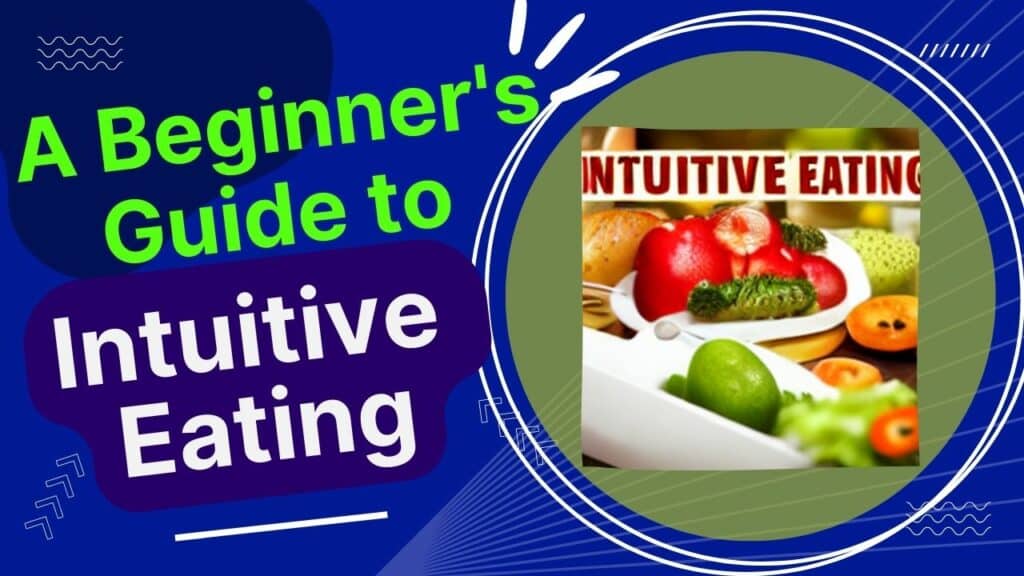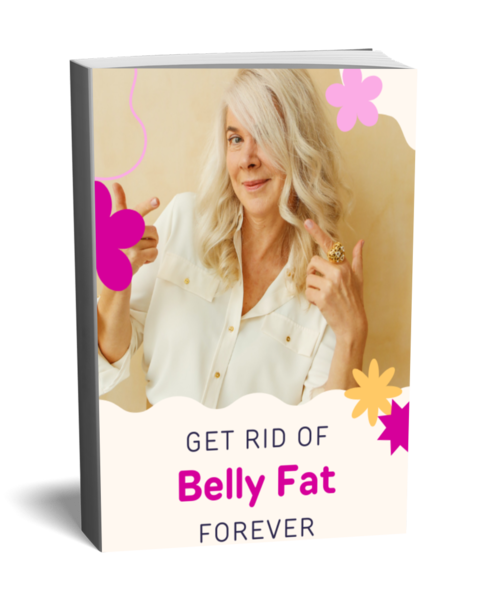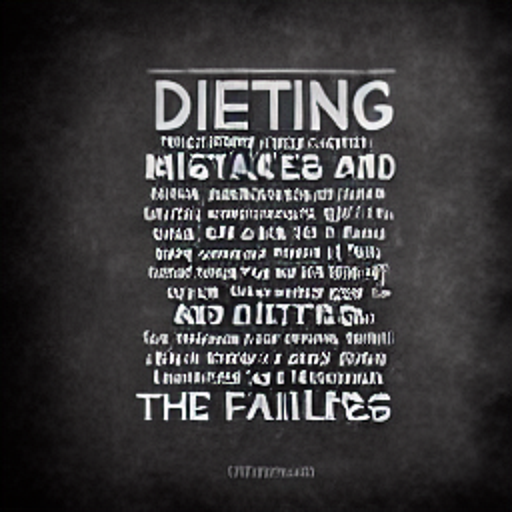A Beginner’s Guide to Intuitive Eating.

Disclosure: You should be aware that some of the links in this article may be affiliate links, which means that if you decide to buy something through one of these links, I may receive a commission, which does not increase the cost to you. This site does not provide financial or medical advice and is just for entertainment purposes. In our privacy policy, you may see our affiliate disclosure.
What is intuitive eating? Intuitive eating is an approach to food and nutrition that is based on the principle of honoring your hunger. It is a non-diet approach that focuses on developing a healthy relationship with food, body, and mind.
How can intuitive eating help me? Intuitive eating can help you to achieve and maintain a healthy weight, learn to listen to your body’s cues, and reduce your risk of developing disordered eating behaviors.
The following is a beginner’s guide to intuitive eating, which is a method of making peace with food and your body. It is based on the principles of honoring your hunger, respecting your fullness, enjoying your food, and finding satisfaction in your eating.
Intuitive eating can be a helpful tool for those who have previously struggled with disordered eating or dieting.
If you’re struggling with your relationship with food, you may have heard of the Intuitive Eating approach. This method of eating is based on becoming in tune with your body’s natural hunger and fullness cues.
It’s a non-diet approach that can be helpful for anyone who has a history of dieting or disordered eating. If you’re interested in giving Intuitive Eating a try, this beginner’s guide will get you started.

Table of Contents
What is intuitive eating?
Intuitive eating is an approach to eating that is in line with our natural, physiological cues. It involves listening to our bodies to determine when what, and how much to eat, without restriction or judgment.
This approach can be beneficial for those who have a history of disordered eating, as it can help to normalize eating patterns and reduce feelings of guilt or shame around food. Additionally, intuitive eating has been shown to improve overall health and well-being.

FREE
Weight Loss eBook
Discover How To Get Rid of Stubborn Belly Fat the Easy Way and Forever.
How do I get started with intuitive eating?
There is no single answer to this question as everyone’s journey with intuitive eating will be unique. However, there are some general principles that can be followed to get started with this approach to food and eating.
First, becoming more attuned to your body and its signals of hunger and fullness is important. This may require slowing down at meals, and being mindful of your eating experience, noticing how different foods make you feel both physically and emotionally.
Recognize your hunger sensations.
When you feel hungry, it is important to recognize the sensation and to understand that your body is telling you it needs nourishment. It is natural to feel a bit of hunger before eating a meal, and this can actually help you to appreciate the food more when you do sit down to eat.
Make peace with food.
The term “making peace with food” is often used in the context of disordered eating or negative body image. It can refer to the process of accepting one’s body and learning to eat in a way that is both physically and emotionally satisfying.
This may involve changing one’s relationship with food, learning to appreciate its role in nourishing the body, and developing a healthy attitude towards eating.
The relationship that individuals have with food is unique and dynamic. For some, food is a source of comfort and security, while for others it may be a source of anxiety and stress. Regardless of where an individual falls on the spectrum, it is important to make peace with food.
One way to make peace with food is to think about it in terms of nourishment. Nourishment refers to the act of providing the body with the necessary nutrients to function properly.
Does intuitive eating actually work?
There is still a lack of scientific evidence to support the claims made by intuitive eating proponents. While some people may find success with this approach, it is not clear if this is due to the method itself or other factors. More research is needed to determine if intuitive eating is an effective weight loss strategy.
There is still much debate surrounding the efficacy of intuitive eating, with some proponents arguing that it is an effective way to promote healthy eating habits, and others asserting that it does not lead to lasting changes in diet or weight. The lack of definitive evidence makes it difficult to say definitively whether intuitive eating “works.”
However, some research suggests that it may be a helpful tool for people who are struggling with their relationship with food.

Can I eat intuitively and lose weight?
Yes! In fact, intuitive eating and weight loss are often connected. Studies have shown that intuitive eaters tend to be healthier than non-intuitive eaters. They are more likely to exercise regularly, and they may also be less likely to engage in binge eating. The reason for this is not entirely clear, but it does seem to be a trend.
Weight loss with intuitive eating is possible. You could, however, also put on weight or just keep your current weight. Your “beginning point” and its relationship to a concept known as your “set point weight” determine what occurs to your body.
A set point weight is a weight at which your body is most comfortable. The weight at which it performs and feels best physically and mentally. (You can read more about the set point weight theory in a full blog post I wrote about it.)
Some people may be below their target weight (perhaps due to a history of dietary restriction and undernutrition), some may be at their target weight, and some may be above their target weight.
Therefore, yes, if someone is overweight generally, they may lose weight. But it isn’t the objective. And we cannot know the precise value of the specified weight. When you’ve been dieting for a long time and have been eating intuitively, it becomes more difficult.
The Benefits of Intuitive Eating on Body Image and Self-Esteem.
There are many benefits to intuitive eating, including improved body image and self-esteem. Intuitive eating is a non-diet approach to nutrition that focuses on listening to your body’s hunger signals and eating in response to those signals. This approach can help you develop a more positive relationship with food and your body. When you eat intuitively, you are more likely to make choices that align with your health goals, which can lead to improved body image and self-esteem.

In the past, researchers have found several favorable connections between intuitive eating and psychosocial aspects, such as body image and related self-esteem. These findings point to the many advantages of this type of eating (i.e., body acceptance, body dissatisfaction, body preoccupation).
The acceptance model of intuitive eating postulates that the development of intuitive eating practices can be traced back to increased levels of overall acceptance of one’s body.
The ultimate path from body appreciation to intuitive eating was validated for emerging adult women (18-25 years), early adult women (26-39 years), and middle-aged adult women (40-65 years) in a study that analyzed the acceptance model of intuitive eating across several age groups.
People who consistently engage in intuitive eating were shown to be more likely to respect their bodies for what they do, to be more aware, and to report higher levels of both self-esteem and overall well-being. They also showed much-reduced levels of both anxiety and depression.
To summarize, adopting a more intuitive approach to food intake will enrich your life in a huge number of various ways. It has the ability to repair your connection with food, putting an end to food fixation as well as the cycle of bingeing and limiting.
Because of its emphasis on body acceptance rather than weight loss, it may assist improve your view of how your body looks. And when you’re not continuously worried with food and nutrition, your mind is free to think about a whole bunch of other, much more interesting and significant things.
Is it possible to gain weight with intuitive eating?
Yes, intuitive eating can promote weight gain for some people, especially those who have a history of following severely restricted diets. But there is no cause to be concerned about your health in light of the fact that you have gained weight. And despite the fact that it may be tough to embrace your larger body in our culture, which is fat-phobic and fixated on being small, it is absolutely doable.

You’ve decided to leave the diet for good and adopt an intuitive eating plan instead. You’re making an attempt to disregard diet culture in favor of listening to your body’s signs for when it’s full and when it needs more food, eating foods that make you feel energized and happy and exercising because you appreciate the way it makes you feel.
It may be freeing to give up dieting and other forms of restriction, but you may find that your weight actually increases. After years (or decades!) of working to shrink your body size and lose weight, it can be tough to realize there might be some weight gain.
The challenge of eating intuitively.
When you eat in an intuitive manner, one of the challenges you will face is determining what kinds of nutrients your body needs and how much of each type of food it needs on a daily basis. This can be a challenging undertaking due to the fact that our bodies are in a state of perpetual change.
The nutritional requirements that we have change depending on our particular physiology, the amount of activity that we get, and the stage of life that we are in.
The human body is a complex machine that requires fuel in the form of nutrients to function properly. Nutrients are found in food and are necessary for the body to grow, repair itself, and maintain good health. Getting to know your body and its nutritional needs has been important in order to ensure that you are providing it with the fuel it needs to function optimally.
However, there are some fundamental concepts that might serve as a map for us to follow when we make decisions that are in accordance with the requirements of our bodies.
Does intuitive eating work for everyone?
There is no straight answer to this since every person is different. Intuitive eating is an approach to eating that is based on paying attention to internal cues of hunger and fullness, rather than following external rules about what, when, and how much to eat. This approach can work for some people, but not for others.
Maybe not everyone would enjoy it. Doctors often recommend limiting specific foods in order to help patients manage health problems like diabetes and high blood pressure. Don’t forget to consult your physician before attempting intuitive eating.
The principles of Intuitive Eating can be used in whatever order one sees fit.
It’s not like a set of instructions where you have to follow each one precisely, and if you break one, you get an F. It’s possible that some people won’t find use for all the rules at all times. Some of the other ideas may still be applicable, though.
Internal regulation, self-care, inclusion, body respect, and coping skills are at the heart of Intuitive Eating. It leveled the playing field in terms of diet and health.
However, the principles may be more difficult to grasp for particular demographics of people and cultures.
Mistakes to avoid: Common mistakes people make when trying to eat intuitively.
When people attempt to eat in an intuitive manner, they frequently fall victim to a few typical pitfalls. One mistake is to ignore the indications that they are giving you about their level of hunger. The signals of hunger are the body’s attempt to communicate with you that it requires sustenance.
Some people are prone to ignore these signs, which can result in either excessive or inadequate food intake. Another error people make is allowing their feelings to determine what they eat and how much of it they consume. Disordered eating behaviors can be triggered by a variety of emotions, including stress, worry, and boredom.

Using intuitive eating to eat as you please.
Yes, intuitive eating encourages letting go of control and restriction and eating what you want. It’s also about respecting and listening to your body’s needs and goals.
If you’re eating intuitively and honoring your hunger and fullness cues, you won’t crave junk food all the time.
When you start listening to your body, you’ll realize that bad food makes you tired, bloated, and blah, but good food makes you energized, satiated, and nourished.
When you rebuild your relationship with your body by eating intuitively, it becomes second nature and you can quit the diet books for good.
Staying Diet-minded.
Intuitive eating is NOT a diet. Most people gain weight because they’ve yo-yo dieted their whole lives. Diet preoccupation and focusing on body size manipulation have cost most people money, time, and energy.
Years of dieting can make it hard to trust your body, establish your true size, and focus on healthy behaviors rather than a scale.
Being open to intuitive eating and giving it a try will lead to body and food liberation.
Dieting with intuitive eating
Intuitive eating isn’t about weight loss. Intuitive eating allows your body to attain its set-point weight range after several months of normal food and exercise.
Some people gain weight when they start intuitive eating, while others lose. Healthy behaviors should be emphasized.
When you live healthily, your body will achieve its set point weight naturally, and this will bring mind and physical transformation that will allow you to live without fretting about the scale.
Finding peace with your body size and accepting healthy behaviors is vital.

Continued food restriction
It’s basically an extension of the “diet mentality” when people utilize discipline and self-control to eat mindfully correctly. Mindful eating means letting go of willpower and self-control and tuning into the body’s demands.
When eating intuitively, forget standards like weighing food, estimating portions, and tracking calories. When we’re in sync with our body, we don’t need these tools.
Healthy habits rely on your body’s own wisdom, not external instruments that tell you what to do. Intuitive eating is a moment-to-moment daily practice of awareness that frees you from diet-related habits.
Judging success and failure
Following intuitive eating involves practice; it’s a lifetime lesson, not an exam. Thinking this manner will keep you in self-judgment and the diet mentality, which is likely why you need to fight cravings and stop overeating.
In intuitive eating, there is no such thing as perfection, thus there’s no need to eat 100% intuitively all the time.
Instead, remain mindful of your thoughts, emotions, and feelings while eating without judgment. Let go of perfectionism and the illusion that you must eat thoughtfully 100% of the time. This isn’t just another diet; it’s a new way of living.
These five faults can hinder intuitive eating. The rewards of this moment-by-moment daily practice will make any problems worth it. This strategy will always be better than other diet approaches you’ve attempted in the past. It will help you live a life where you’re no longer controlled by food or obsessed with your weight.
Summary.
It is unfortunate that intuitive eating is frequently marketed as a diet, or even as a non-diet diet; nevertheless, this is not the focus of this approach to eating. Simply said, it’s about developing a positive relationship with food, as well as your mind and body.
A definition of “intuitive eating” Following your hunger cues is at the heart of the intuitive eating philosophy. It’s not a diet per se, but rather a strategy that emphasizes a balance between eating for nourishment and enjoyment and taking care of one’s physical and mental health.
If I practice intuitive eating, how will it benefit me? Achieving and maintaining a healthy weight, learning to listen to your body’s messages, and lowering your chance of developing eating disorders are all possible outcomes of adopting an intuitive eating approach.

FREE
Weight Loss eBook
Discover How To Get Rid of Stubborn Belly Fat the Easy Way and Forever.
Disclosure: You should be aware that some of the links in this article may be affiliate links, which means that if you decide to buy something through one of these links, I may receive a commission, which does not increase the cost to you. This site does not provide financial or medical advice and is just for entertainment purposes. In our privacy policy, you may see our affiliate disclosure..




